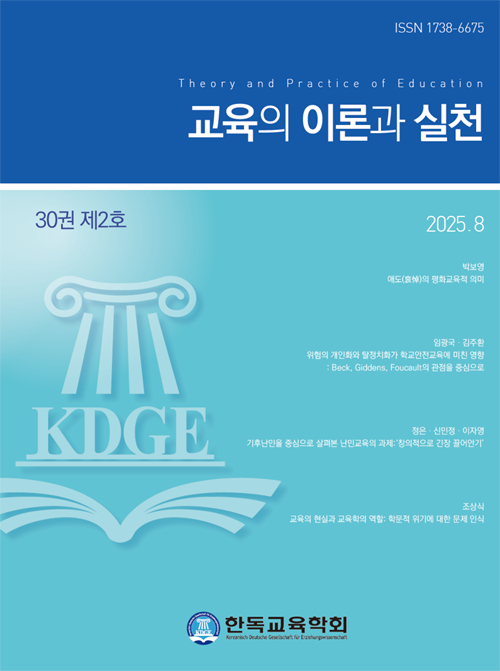The Impact of Risk Individualization and Depoliticization on School Safety Education: A Critical Analysis Based on the Theories of Ulrich Beck, Anthony Giddens, and Michel Foucault
위험의 개인화와 탈정치화가 학교안전교육에 미친 영향: Beck, Giddens, Foucault의 관점을 중심으로
- Koreanisch-Deutsche Gesellschaft Fuer Erziehungswissenschaft
- Theory and Practice of Education
- Vol.30 No.2
-
2025.0819 - 39 (21 pages)
-
DOI : 10.26894/kdge.2025.30.2.19
- 18

본 연구는 후기근대 사회에서 위험이 어떻게 탈정치화되고 개인화되는지를 분석하며, 이러한 경향이 학교안전교육의 담론과 실천에 어떠한 영향을 미치는지를 비판적으로 고찰한다. 이를 위해 울리히 벡(Ulrich Beck)의 ‘위험의 개인화’와 ‘조직화된 무책임’, 앤서니 기든스(Anthony Giddens)의 ‘성찰적 자아’와 ‘제도적 신뢰’, 미셸 푸코(Michel Foucault)의 ‘통치성’과 ‘생명정치’ 개념과 같은 위험과 재난에 대한 대표적인 탈정치화 담론들에 기초하여, 세월호 참사, 코로나19 팬데믹, 이태원 참사 등 한국 사회의 주요 재난 사례를 분석하였다. 본 연구는 이러한 분석을 통해 학교안전교육이 위험을 사회적·정치적 문제로 접근하기보다는, 이를 학생 개인의 윤리적 판단과 행동 규범의 실천 수준으로 환원하는 경향이 있음을 확인하였다. 이는 위험에 대한 집합적 성찰을 제약하고, 책임의 구조적 분산을 은폐하는 탈정치화의 논리가 교육 실천 안에 제도화되고 있음을 시사한다. 특히 『2024년 학교안전교육 7대 표준안』은 제도적 실패나 사회적 맥락에 대한 언급 없이, 학생들에게 정형화된 행동요령을 반복 학습하는 방식으로 설계되어 있으며, 이는 국가의 안전관리 한계를 교육의 규율화된 훈육으로 대체하려는 생명정치적 통치 기술의 한 양상으로 해석될 수 있다. 이에 본 연구는 학교안전교육이 기술 중심의 훈련 교육을 넘어서, 위험의 사회적 구성과 제도적 책임을 성찰하는 비판적 시민교육으로 전환되어야 함을 제안한다. 이를 위해 구조적 원인 분석, 성찰적 토론, 피해자 중심 교육, 교사 연수 강화, 교육 거버넌스 개편 등의 방향을 모색하였다. 이를 통해 본 연구는 학교가 단지 규범을 주입하는 공간을 넘어서, 위험에 대한 사회적 성찰과 민주적 책임을 학습하는 공적 교육의 장으로 기능해야 함을 강조한다.
This study critically examines how risk is depoliticized and individualized in late modern society, and how these tendencies manifest within school safety education in South Korea. Drawing on Ulrich Beck’s concepts of “individualization of risk” and “organized irresponsibility,” Anthony Giddens’s notions of “reflexive self” and “institutional trust,” and Michel Foucault’s theories of “governmentality” and “biopolitics,” this paper analyzes key national disaster cases including the Sewol ferry disaster, the COVID-19 pandemic, and the Itaewon crowd crush. The findings reveal that school safety education tends to shift the discourse of risk from structural and political dimensions to individualized moral responsibility and behavioral norms. This indicates that depoliticization strategies are being institutionalized through education, effectively obscuring the structural causes of risk and displacing public accountability. In particular, the “2024 National School Safety Education Standards” are designed to drill predetermined behavioral responses without fostering critical reflection on institutional failure or social context. This represents a clear instance of biopolitical governance that replaces collective responsibility with disciplinary control. This study critically examines how risk is depoliticized and individualized in late modern society, and how these tendencies manifest within school safety education in South Korea. Drawing on Ulrich Beck’s concepts of “individualization of risk” and “organized irresponsibility,” Anthony Giddens’s notions of “reflexive self” and “institutional trust,” and Michel Foucault’s theories of “governmentality” and “biopolitics,” this study examine key national disaster cases such as the Sewol ferry disaster, the COVID-19 pandemic, and the Itaewon crowd crush. The findings reveal that school safety education tends to shift the discourse of risk from structural and political dimensions to individualized moral responsibility and behavioral norms. This point indicates that depoliticization strategies are being institutionalized through education, effectively obscuring the structural causes of risk and displacing public accountability. For instance, the “Seven Stadards for School Safety Education” are designed to drill predetermined behavioral responses without fostering critical reflection on institutional failure or social context. This study thus argues for a paradigm shift from technocratic, compliance-based instruction toward a critical citizenship education that engages with the social construction of risk and institutional responsibility. This work suggests directions that include structural cause analysis, reflective dialogue, victim-centered pedagogy, enhanced teacher training, and reforms in educational governance. Schools serves not merely as sites for the internalization of norms, but as public spaces where students critically reflect on risk and learn to exercise democratic responsibility.
Ⅰ. 서론
Ⅱ. 위험의 탈정치화에 대한 담론들: 벡, 기든스, 푸코의 관점
Ⅲ. 재난의 탈 정치화: 세월호 참사, COVID-19, 이태원 참사의 사례
Ⅳ. 학교안전교육의 탈정치화, 개인화 경향
Ⅴ. 결론: 학교안전교육의 탈정치성 극복을 위한 전환
참고문헌
(0)
(0)